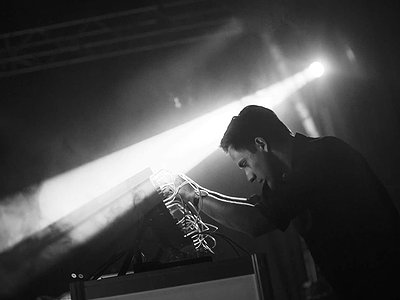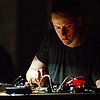Name: Oleg Shpudeiko
Nationality: Ukrainian
Occupation: Composer, Producer
Current Release: Iridescent on Injazero
Recommendations: Listening to War: Sound, Music, Trauma, and Survival in Wartime Iraq /J. Martin Daughtry
Sinister Resonance: The Mediumship of the Listener /David Toop
If you enjoyed this interview with Heinali, check out his excellent website for more biographical background information, music and release news.
When did you start writing/producing music - and what or who were your early passions and influences? What what is about music and/or sound that drew you to it?
I started in 2003. My earliest influence was music I listened to back then, as a teenager. Coil, Nine Inch Nails, The Sisters of Mercy, Current 93, Telefon Tel Aviv, Aphex Twin, Sal Solaris, for example.
I guess, the main thing about the music that drew me in was the possibility of achieving a state that transcends musical practice. And the fact that music did things to me no other art form could do. But it’s a rationalization, from a distance. Back then it was just something to do, something new to mess around with, not even a hobby. It became a hobby and then turned into a profession gradually over the years.
For most artists, originality is first preceded by a phase of learning and, often, emulating others. What was this like for you? How would you describe your own development as an artist and the transition towards your own voice? What is the the relationship between copying, learning and your own creativity?
I spent the first 10 years learning from and copying other music, both intentionally and unintentionally. It wasn’t a rational process, it was more like being under an influence that’s so strong it forms your own practice.
I think one of the reasons was that my skills were not developed enough, I didn’t have any musical education, so anything I heard from artists I loved sounded like magic.
I don’t think I could describe the transition towards my own voice, though, it just happened little by little. Maybe because I finally developed the skills so I could be in parity with artists I admired, so it became more like a dialogue instead of a sermon. Or maybe the reason is entirely different.
What were your main compositional- and production-challenges in the beginning and how have they changed over time?
My main compositional challenges in the beginning were formed by a lack of knowledge. As an autodidact I had to learn everything myself, by trial and error and, at the same time, find ways to overcome my weak points in my practice. Of course, finances played an important role as well. I couldn’t afford a decent home setup for a very long time, until I started making a living composing music.
I think my main compositional challenge right now is a lack of time. I’m in a permanent process of workflow optimisation. Another challenge is finding a balance between what instrument wants me to do and what I want to do with the instrument.
What was your first studio like? How and for what reasons has your set-up evolved over the years and what are currently some of the most important pieces of gear for you?
My first studio in 2003 was just a home computer with multimedia speakers and amateur sound card. It was a Sound Blaster Audigy, if I recall correctly. I worked in Jeskola Buzz initially, but gradually switched to Cubase in the following years and got a cheap MIDI keyboard. It stayed pretty much the same until I started composing music professionally, somewhere around 2014, and could afford a better setup.
Right now I have an eurorack modular system based on Make Noise modules, Access Virus Ti2 Polar, KORG MS20, Neumann KH120 for monitoring with RME Babyface. My workflow is structured around my modular system, so it’s probably the most important piece of gear for me currently.
How do you make use of technology? In terms of the feedback mechanism between technology and creativity, what do humans excel at, what do machines excel at?
I think a good machine excels at triggering human’s personal fetishes. A human excels at the production of meaning. All the obvious technical differences apart, such as randomness, preciseness, memory and capacity to make mistakes that, I think, have been discussed ad nauseam.
Production tools, from instruments to complex software environments, contribute to the compositional process. How does this manifest itself in your work? Can you describe the co-authorship between yourself and your tools?
I would say, they don’t just contribute, but actively influence musical practice, sometimes they can even form musical practices. And it’s not just a matter of complex interplay inside a set of technical restrictions and capabilities they offer, it’s also about their material reality, their personal story and aura. For example, let’s assume you have two guitars. They’re physically the same, absolute identical copies that have identical sound. But one you bought in a guitar shop and another one was a gift from a famous artist you have a strong connection with. Maybe it’s Cobain or Hendrix. What kind of musicr would want you to play on the first guita? What kind of music would want you to play on the second guitar?
As with any other parameter of any musical practice, you can choose either to ignore it or to acknowledge it and work with it. My personal opinion is that the more parameters you “emancipate” for your practice, the more of a conscientious and responsible artist you are.
I think that contemporary improvisation interactions in general and, especially, when it comes to electroacoustic free improvisation are structured in the form of a triangle. Its three points are: musician, instrument, space. The space is not just an acoustic space, but includes the audience as well. Every angle is in a relationship with two neighboring angles. The quality, length and density of the lines of interaction can vary, but the geometry stays the same. The instrument (technology) in this figure is not just a means to achieve the author’s goal, but, more like, a full participant of the performance. For composers, instruments are the means to achieve their ideas, and the material’s borders are formed by ideology or musical form, revealing the rules of a game and, subsequently, methods of their subversion. For improvisers, conversely, instruments (technology) create form and generate ideas. The interaction takes place, in parity, instrument’s limitations make the rules of the game and, at the same time, contain in themselves opportunities for their overcoming, their subversion.
Collaborations can take on many forms. What role do they play in your approach and what are your preferred ways of engaging with other creatives through, for example, file sharing, jamming or just talking about ideas?
In general I try to look for collaborations that offer a deep and rich communication between parties, with a certain degree of interpenetration of practices. Especially when it comes to interdisciplinary projects. When a musician just does their thing and a visual artist (or choreographer or any other media artist) just does theirs, the resulting combination is usually quite poor both in terms of quality of meaning produced and of quality of a discourse achieved. All the opportunities to learn from each other’s practice, to form a new language and produce rich, multifaceted, true interdisciplinary meanings are lost.
There are exceptions, of course.
Could you take us through a day in your life, from a possible morning routine through to your work? Do you have a fixed schedule? How do music and other aspects of your life feed back into each other - do you separate them or instead try to make them blend seamlessly?
I don’t have a fixed schedule and every day is slightly different. It depends on how much work I have, the amount of meetings planned etc. and it always differs. I probably would have a schedule if I had a studio separate from home, I’d might go full Kraftwerk in that case, arriving at 9am and going back home at 7pm. It might be an interesting experiment.
I don’t think I can separate music from my life, and I realised it only recently, when I had to do it for quite a long time due to specific circumstances and it was nerve-wracking and absolutely terrible, I turned into a mess. I’m not looking forward to experience anything like that again.



